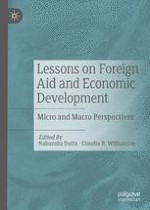2019 | OriginalPaper | Chapter
11. Potential Pitfalls in Private Aid: A Cautionary Note for Non-Governmental Assistance
Author : Thomas K. Duncan
Published in: Lessons on Foreign Aid and Economic Development
Publisher: Springer International Publishing
Activate our intelligent search to find suitable subject content or patents.
Select sections of text to find matching patents with Artificial Intelligence. powered by
Select sections of text to find additional relevant content using AI-assisted search. powered by
